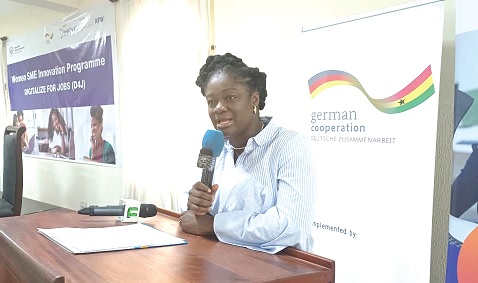
Operations of 410 women-led SMEs digitalised
More than 410 women-led Small and Medium Enterprises (SMEs) selected across the country have been empowered to digitalise their operations and become visible online.
The entrepreneurship support scheme created the needed platform for the beneficiary SMEs to fully leverage the potential of digitalisation and accounting solutions that allow them to improve their financial management practices and facilitate their access to finance.
They were further trained to build their online visibility via company-owned websites and social media to expand their customer base and increase their turnover.
Dubbed Women SME Innovation Programme—Digitalise for Jobs (D4J), the 12-month-long project was implemented by the Ghana Enterprises Agency (GEA) and German Development Cooperation.
The project, which was the second phase of the COVID-19 SME Digitalisation and Innovation Support Scheme, benefited women-led SMEs from the Greater Accra, Eastern, Ashanti, Bono, Central, and Northern regions of the country.
Govt’s commitment
Speaking at the closeout ceremony to mark the successful completion of the programme in Accra recently, the Chief Executive Officer (CEO) of GEA, Kosi Yankey-Ayeh, stated that the government was committed to helping transform businesses to make their operations easier, faster and cheaper.
![]()
The participants in the closeout session
She explained that GEA, operating under the Ministry of Trade and Industries (MoTI), was entrusted with the mandate to improve the competitiveness of SMEs by facilitating the provision of business development programmes and integrated support services.
“Our paramount focus lies in fortifying the operations of SMEs through digitalisation—an endeavour that facilitates streamlined, expedited and cost-effective business processes.
“We successfully executed the COVID-19 SME Digitalisation and Innovation Support Scheme in 2021.
This initiative aimed to sustain existing SMEs, fortify their resilience amidst the challenges posed by the COVID-19 crisis, and usher them into a recovery phase that secures jobs in the medium to long term,” she said.
The CEO stated that the conclusion of the aforementioned project heralded the commencement of the Women SME Innovation Programme: Digitalise for Jobs.
“Recognising the escalating interest among MSMEs in digitalising their operations, particularly in the aftermath of the COVID-19 pandemic, this project was conceived,” she added.
Process of change
The Team Leader of Invest for Jobs at GIZ-Ghana, John Duti, explained that if SMEs want to achieve digitalisation, they need to embrace a process of change in their enterprises and develop new skills.
He said there was a need to tackle the digital gender gap to help encourage more women-led firms to digitalise and enhance their operations.
“A just transition towards a more sustainable future for all of us can only happen if we empower women to engage fully in economic activities in the digital era,” he said.

 Click the link to read your copy.
Click the link to read your copy.